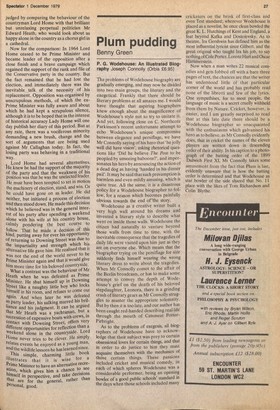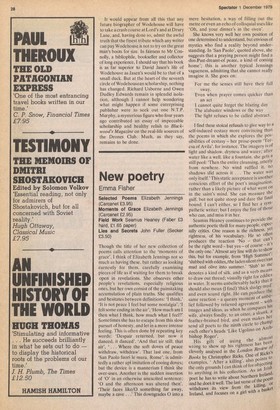Plum pudding
Benny Green
P. G. Wodehouse: An Illustrated Biography Joseph Connolly (Orbis £6.95) The problems of Wodehouse biography are gradually emerging, and may now be divided into two main groups, the literary and the exegetical. Frankly that there should be• literary problems at all amazes me. I would have thought that aspiring biographers knew enough about the magnificence of Wodehouse's style not to try to imitate it. And yet, following close on C. Northcote Parkinson's recent unfortunate attempt to echo Wodehouse's unique compromise between elegance and persiflage, we have Mr Connolly saying of his hero that 'he jolly well did have vision', asking rhetorical questions like 'Did he believe The Post to be peopled by unseeing baboons?', and impersonates his hero by announcing the action of a dead dog as having 'handed in his dinner pail'. It may be said that such presumption is harmless and even mildly amusing, which is quite true. All the same, it is a disastrous policy for a Wodehouse biographer to fol: low, for a reason which becomes painfully obvious towards the end of the story.
Wodehouse as a creative writer built a very high wall around his dreams and invented a literary style to describe what went on inside those walls. Wodehouse the citizen had naturally to venture beyond those walls from time to time, with the inevitable consequence that the tragedies of daily life were visited upon him just as they are on everyone else. Which means that the biographer trying on the persiflage for size suddenly finds himself wearing the wrong literary dress to write about the tragedies. When Mr Connolly comes to the affair of the Berlin broadcasts, or has to make some attempt to convey the depth of Wodehouse's grief on the death of his beloved stepdaughter, Leonora, there is a grinding crash of literary gears as Mr Connolly struggles to muster the appropriate solemnity. But by then it is too late, and our author has been caught red-handed describing real life through the mouth of Catsmeat PotterPirbright. As to the problems of exegesis. all biographers of Wodehouse have to acknow ledge that their subject was prey to certain obsessional loves for certain things, and that in order to do justice to him they must acquaint themselves with the mechanics of those certain things. These passions included cricket and musical comedy, in each of which spheres Wodehouse was a considerable performer, being an opening bowler of a good public schools' standard in the days when those schools included many cricketers on the brink of first-class and even Test standard; wherever Wodehouse is placed as a novelist, he once clean bowled the great K. L. Hutchings of Kent and England. a feat beyond Kafka and Dostoievsky. As to theatre, Ira Gershwin has defined him as the most influential lyricist since Gilbert, and the great original who taught Ira his job, to say nothing of Cole Porter, Lorenz Hart and Oscar Hammerstein.
Now when a man writes 22 musical comedies and gets fobbed off with a bare three pages of text, the chances are that the writer has understood little of that particular comer of the world and has probably read none of the libretti and few of the lyrics. One sympathises, for to most people, the language of music is a secret cruelly withheld from them by Nature. Cricket, however, is easier, and I am greatly surprised to read that at this late date there should be a Wodehouse biographer so unacquainted with the enthusiasms which galvanised his hero as to believe, as Mr Connolly evidently does, that in cricket the names of the eleven players are written down in descending order of their ability. In his caption to a photograph of the batting order of the 1899 Dulwich First XL Mr Connolly takes some amusement from the fact that Plum is last, evidently unaware that is how the batting order is determined and that Wodehouse as star bowler of the side shared that No. 11 place with the likes of Tom Richardson and Colin Blythe. It would appear from all this that any future biographer of Wodehouse will have to take a crash course at Lord's and at Drury Lane, and, having done so, admit the awful truth that the finest tribute which any writer can pay Wodehouse is not to try on the great man's boots for size. In fairness to Mr Connolly, a bibliophile, bookseller and collector of long experience, I should say that his book is as far superior to David Jasen's life of Wodehouse as Jasen's would be to that of a small duck. But at the heart of the seventh circle of Wodehousean scholarship, nothing has changed. Richard Usborne and Owen Dudley Edwards remain in splendid isolation, although I cannot help wondering what might happen if some enterprising publisher were to seek out one N.T.P. Murphy, a mysterious figure who four years ago contributed an essay of impeccable scholarship and healthy relish to Blackwood's Magazine on the real-life sources of the Drones Club. Much, as they say, remains to be done.












































 Previous page
Previous page